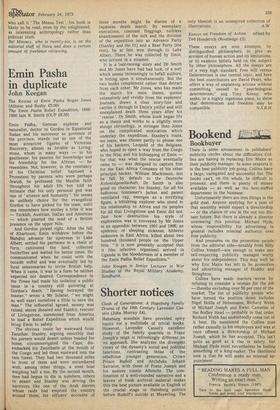Emin Pasha in duplicate
John Keegan
The Rescue of Emin Pasha Roger Jones (Allison and Busby £5.00) The Emin Pasha Relief Expedition, 18861890 lain R. Smith (OUP £6.50) Emin Pas'ha, German explorer and naturalist, doctor to Gordon in Equatorial Sudan and his successor as governor of the province, stands out as one of the most attractive figures of Victorian discovery, almost as lovable as Livingstone, whom in many ways — in his gentleness, his passion for knowledge and his friendship for the African — he resembles. Not, however, in the constancy of his Christian belief: baptised a Protestant by parents who were perhaps Jewish, he professed the Muslim faith throughout his adult life but told an intimate that his only personal god was one of ' science and humanity '. He seems an unlikely choice for the evangelical Gordon to have picked for his team, until one remembers how motley a tribe it was Turkish, Austrian, Italian and American — which planted the seed of a British presence on the upper Nile.
And Gordon picked right. After the fall of Khartoum, Emin withdrew before the Mandist advance far upstream to Lake Albert, settled his garrisons in a chain of forts, cultivated the land, collected butterflies and waited for better times. He communicated when he could with the outside wdEd and was eventually led by local missionaries to invite British help. When it came, it was in a form he neither expected nor desired. Correspondence in the Times had made his isolation a public issue in a country still quivering at Gordon's death. "Having betrayed the master," wrote a Mr Sclater, " we might as well exert ourselves a little to save the man." The influential agreed, money was raised, stores donated and Stanley, rescuer of Livingstone, summoned from America to lead a Relief Expedition which would bring Emin to safety.
The obvious route lay westward from Zanzibar. Stanley, arguing smoothly that his porters would desert unless headed for home, circumnavigated the Cape, disembarked his Zanzibaris at the mouth of the Congo and led them eastward into the rain forest. They had two thousand miles in front of them and were encumbered With, among other things, a steel boat weighing half a ton. By the second month, men had begun to die in numbers, others to desert and Stanley was driving the survivors like one of the Arab slavers Whose raids had emptied the country around them; his officers' accounts of these months might be diaries of a Japanese death march. By exemplary executions, constant floggings, ruthless abandonment of the sick and the division of the expedition into an Advance Party (Stanley and the fit) and a Rear Party (the rest), he at last won through to Lake Albert. There he was collected by Emin, who arrived in a steamer.
It is a hair-raising story and Dr Smith and Mr Jones have had bad luck, of a sort which seems increasingly to befall authors, in hitting upon it simultaneously. But the two books complement rather than detract from each other. Mr Jones, who has made the march his main theme, quotes extensively and vividly from the explorers' journals, draws a clear story-line and carries it through to Emin's pitiful and still unexplained death three years after his ' rescue '. Dr Smith, whose book began life as a thesis and works to a slightly more abrupt chronology, is stronger than Jones on the complicated motivation which underlay the expedition. Stanley's route, we learn, was chosen partly to please one of his backers, Leopold of the Belgians, who hoped to open a way from the Congo to the Nile; and his kidnapping of Emin — for that was what the rescue eventually came to — was designed to capture him for the East Africa Company of his other principal backer, William Mackinnon, lest he fall by default to the Deutsche Kolonialgesellschaft. Dr Smith is also good on character; his Stanley, for all his ludicrous liontamer's jacket and patent ventilated cap, emerges as a terrifying figure, a blitzkrieg explorer who stood in his relationship to Africa and its peoples for all that Livingstone and Emin did not. Just how destructive his style of exploration was is conveyed by Mr Jones in an appendix: between 1901 and 1906, an epidemic of sleeping sickness, hitherto unknown in East Africa, killed about two hundred thousand people on the Upper Nile. "It is now generally accepted that it [the infective organism] arrived in Uganda in the bloodstream of a member of the Emin Pas'ha Relief Expedition."
John Keegan is Senior Lecturer in War Studies at the Royal Military Academy, Sandhurst.


































 Previous page
Previous page